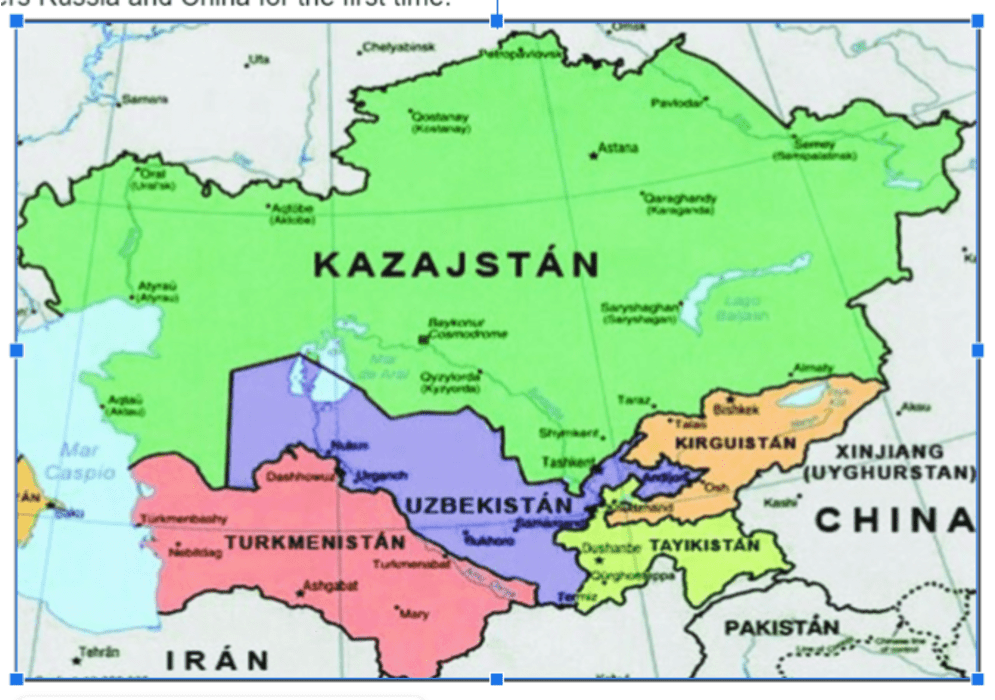News Excerpt:
Central Asian countries initiated joint military exercises without the participation of regional powers Russia and China for the first time.

About the military exercise Birlestik-2024:
- The exercises, named Birlestik-2024, which means "alliance" in Kazakh, are hosted by Kazakhstan and include four other ex-Soviet states.
- The drills will take place in the Caspian Sea and involve around 4,000 troops, warships, aviation, artillery, and tanks.
- Kazakhstan, Kyrgyzstan, Uzbekistan, and Tajikistan are the participating countries, with Turkmenistan notably absent. Additionally, Azerbaijan, a Caucasus country, is participating in these exercises.
Strategic Implications:
- Traditionally, these Central Asian countries have participated in military drills alongside Russia through the Collective Security Treaty Organisation (CSTO) and with China under the Shanghai Cooperation Organisation (SCO).
- This shift towards independent regional cooperation comes after decades of strife and is indicative of the increasing self-reliance among Central Asian states.
- The region's rich natural resources and strategic importance as a trade route have attracted significant international interest.
- All participating countries are part of the "Middle Corridor," a transport route connecting China and Europe that bypasses Russia.
|
Collective Security Treaty Organization (CSTO):
The Collective Security Treaty Organization (CSTO) is an intergovernmental military alliance that comprises several former Soviet republics.
History
- Formation: The CSTO was initially formed in 1992 with the signing of the Collective Security Treaty (also known as the Tashkent Pact) by Armenia, Kazakhstan, Kyrgyzstan, Russia, Tajikistan, and Uzbekistan. The treaty came into force in 1994.
- Establishment: The CSTO as an organization was formally established in 2002.
- Headquarters: The CSTO is headquartered in Moscow, Russia.
Member States
- Current Members: Armenia, Belarus, Kazakhstan, Kyrgyzstan, Russia, and Tajikistan.
- Former Members: Uzbekistan (withdrew in 1999, rejoined in 2006, and withdrew again in 2012), Azerbaijan (withdrew in 1999), and Georgia (withdrew in 1999).
Objectives and Functions
- Collective Defense: The CSTO operates on the principle of collective defense, similar to NATO. An armed attack against one member state is considered an attack against all member states.
- Military Cooperation: Member states conduct joint military exercises, share intelligence, and collaborate on counter-terrorism, drug trafficking, and other security issues.
- Crisis Response: The CSTO can deploy peacekeeping forces and provide support in times of internal unrest or external aggression.
Key Activities
- Joint Exercises: The CSTO regularly conducts joint military drills to enhance interoperability among member states' armed forces.
- Peacekeeping Operations: The CSTO has developed a peacekeeping capacity and can deploy forces to member states facing security challenges.
- Counter-Terrorism: A significant focus of the CSTO is on counter-terrorism efforts, including intelligence sharing and coordinated operations.
Strategic Importance
- Geopolitical Influence: The CSTO serves as a tool for Russia to maintain influence in the post-Soviet space and counterbalance NATO's presence.
- Regional Stability: The organization aims to enhance regional stability and security through collective efforts.
Organizational Structure
- Decision-Making: The CSTO operates through consensus among member states. Key decisions are made by the Collective Security Council, which comprises the heads of state of the member countries.
- Secretary-General: The Secretary-General is the chief administrative officer of the CSTO and is responsible for executing the decisions of the Collective Security Council.
Recent Developments
- Increased Drills: The CSTO has ramped up its joint military exercises in recent years, reflecting growing security concerns in the region.
- Response to Conflicts: The organization has been involved in discussions and support measures related to conflicts in member states, such as the political unrest in Kyrgyzstan and border clashes involving Armenia and Azerbaijan.
|



